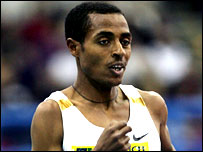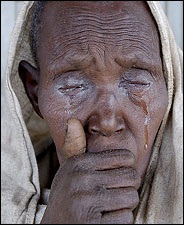
ERITREA-ETHIOPIA: 'Troops harvesting buffer zone'
NAIROBI, 17 October (IRIN) - Eritrea has moved 1,500 troops and 14 tanks to a buffer zone along its border with Ethiopia, which was created after the war between the two countries over their disputed frontier. The United Nations Secretary-General described the Eritrean incursion as a major violation of the ceasefire agreement.
However, Eritrea's information minister, Ali Abdu, said the troops had moved to the Temporary Security Zone (TSZ) to help harvest crops from state-run farms in the area, which, he said, constitutes one-third of Eritrean territory.
"It has nothing to do with the border issue. They [the troops] are involved in production and food security," he told IRIN.(More...)
Ethiopia sees no military response against Eritrea
ADDIS ABABA, Oct 17 (Reuters) - Ethiopian Prime Minister Meles Zenawi said on Tuesday his country would not respond militarily to what he called a "minor provocation" after Eritrea moved troops into a U.N.-monitored buffer zone on the border.
"The U.N. has said all the things which had to be said," he told reporters. "Eritrea's troop movement is a clear violation of the Algiers ceasefire agreement. We are not going to respond to minor provocations militarily." (More...)
Somalia: Union of Islamic Courts Issues Decisions Against Ethiopia
Senior members of the Union of Islamic Courts and former Somali national army have convened on Tuesday in the capital Mogadishu over what they said the defense of Somalia against the minority Tigree government of Ethiopia.
2nd vice chair of the Islamic Courts executive council Sheik Abdulkadir Ali Omar and the national security secretary Sheik Yusuf Indho-adde were some of the senior Islamist members that attended the meeting.
Sheik Yusuf Indho-adde, who spoke at the meeting, said that after they had realized Ethiopia would not give up the interference and division of Somalia, they decided to cooperate with former national army and the Somali civilian population to defeat what Indho-adde called the reluctant enemy of the Ethiopian Tigree government.(More...)
-------------------------------------------------------------------
Don’t miss your chance to help select the Athlete of the Year - Vote is now Open



'Female Athlete of the Year'
Meseret Defar (ETH)
Tirunesh Dibaba (ETH)
'male Athlete of the Year'
Kenenisa Bekele (ETH)
-------------------------------------------------------------------
Africa's Lagging Development-'Why Are They Poor?' [PART 4]
by Jason Beaubien (This series examines how armed conflict, poor agricultural practices, disease, lousy governments and foreign trade practices contribute to making Africa the poorest continent in the world.)
(This series examines how armed conflict, poor agricultural practices, disease, lousy governments and foreign trade practices contribute to making Africa the poorest continent in the world.)
AIDS, Other Diseases Create Poverty Trap in Africa
The United Nations estimates that 2 million Africans die each year of AIDS, and 24 million are infected with HIV. Incidents of malaria, cholera and even polio are on the rise in Africa, all undermining social and economic development on the globe's most impoverished continent.
Swaziland is a tiny kingdom of just a million people squeezed between South Africa and Mozambique. It's also the country with the highest HIV rate in the world.
At some prenatal clinics, more than half the women are HIV-positive. About 33 percent of adults in Swaziland are infected with the virus.
Even before the AIDS pandemic, Swaziland was in the ranks of the world's least-developed countries and HIV has contributed to keeping it there.
Pindile Polatwana, 27, was forced to quit her job in a textile factory because she was having trouble breathing.
"I was sick. They said I've got TB. Then later they told me I'm HIV-positive," she says.
Polatwana moved back in with her mother in a cluster of ramshackle buildings in southwest Swaziland. She says HIV has devastated her homestead. In the past five years, her father passed away after a long illness, two of her siblings died of AIDS and Polatwana has become so sick she can no longer work.
"The diseases make us very poor," Polatwana says.
AIDS wipes out some of the most productive members of society in the prime of their lives.
Pindile's siblings who died were the most educated members of her family and they both passed away at the age of 32. Her family now relies on relief supplies from the World Food Program to survive.
HIV is among many health problems plaguing Africa. The continent spawned Ebola and the Marburg virus. Sleeping sickness, river blindness, yellow fever, cholera, bilharzia, tick bite fever -- diseases unheard of in the developed world -- are all too common in Africa. Polio is making a comeback in Africa after being on the verge of being wiped off the globe. And malaria alone kills nearly 1 million African children each year.
Jon Lidon, with the Global Fund to Fight AIDS, TB and Malaria, says malaria places a huge burden on Africa.
"It reduces productivity severely," Lidon says. "It takes resources away. It reduces school attendance. [It] kills off children, which has all sorts of other negative consequences. And it makes whole areas of Africa unsuitable for intensive foreign investment."
He adds that dilapidated health-care systems are unable to deal with the continent's numerous medical problems.
Clinics are ill-equipped and underfunded. In the Congolese capital Kinshasa, for instance, patients must purchase their own medical supplies before being admitted to the central hospital because the facility doesn't even have bandages.
The continent also has a serious shortage of medical professionals. Malawi has only 130 doctors serving a country of 12 million people, Lidon says.
Africa needs a huge influx of foreign aid to build up effective health-care programs, he says.
"There are countries that spend $10, $12, $15 per capita a year on health," Lidon says. "You can't buy anything for that -- a couple dressings, a few medicines. You cannot run a health system at that level of funding."
The Global Fund was launched in 2002 to provide billions of additional dollars to combat AIDS, TB and malaria in Africa and the rest of the developing world. Lidon and others acknowledge that the battle against these three diseases still has a long way to go.
Disease is part of the poverty trap in Africa. People get sick because they're poor. And they get poorer because they're sick. A man can't afford health care, he's condition worsens until he can't work, and soon his entire family is malnourished as a result of his illness.
Or even worse, the primary breadwinners of a family could die.
In Swaziland, 66-year-old Shote Maseko says HIV has surrounded him in recent years.
Maseko has just come home from helping prepare funerals for three of his neighbors who died of AIDS. He points to a shack in an adjoining plot and says that the woman there just lost her husband to the disease.
Maseko and his wife live in a simple three-room house without electricity or indoor plumbing. Over the past four years, the couple lost three of their adult daughters to AIDS. And they now look after eight orphaned grandchildren; the youngest is three years old.
Maseko lost a leg years ago in an accident at a sugar plantation where he used work. Now in his old age he tries to grow food to feed his vastly expanded family but he says his fields don't produce enough to last the entire year.
His wife Josephine opens the door to the room where six of the eight children sleep. There are two beds. Three children sleep per bed.
Maseko says other members of the family don't want to get involved with the orphans because they're afraid they'll get stuck with them when he and Josephine pass away.
And when that happens, Maseko says he doesn't know where the kids will go.
"We are so worried, and it is our prayer to God that we live long enough to see these children grow up so they are able to help themselves," he says.
Today's Top Stories
-Clone H.R. 5680 Everywhere!-Will Somalia Be the Final Battle Between Islam And the West?
-Guatemale and Venezuela deadlocked over UN Security Council seat
-N.Korea defiant amid fears of second nuclear test
-Unusual meteorite found in Kansas
-300 million and counting
-Wesley Snipes indicted in tax fraud case
-Fabolous Shot In Manhattan